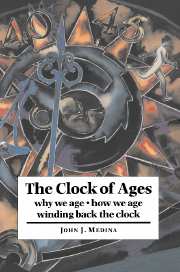Book contents
- Frontmatter
- Contents
- Preface
- To Doris Medina 1929–1993
- PART ONE Who ages?
- PART TWO How do we age?
- INTRODUCTION
- 4 How the skin and hair age
- 5 The aging of bones, muscles and joints
- 6 The aging of the brain
- 7 How the heart ages
- 8 The aging of the lungs
- 9 What happens to the digestion
- 10 How the senses age
- 11 The aging of the reproductive system
- PART THREE Why do we age?
- Further reading
- Index
9 - What happens to the digestion
Published online by Cambridge University Press: 05 August 2012
- Frontmatter
- Contents
- Preface
- To Doris Medina 1929–1993
- PART ONE Who ages?
- PART TWO How do we age?
- INTRODUCTION
- 4 How the skin and hair age
- 5 The aging of bones, muscles and joints
- 6 The aging of the brain
- 7 How the heart ages
- 8 The aging of the lungs
- 9 What happens to the digestion
- 10 How the senses age
- 11 The aging of the reproductive system
- PART THREE Why do we age?
- Further reading
- Index
Summary
Even if it's not true, you have to admit, it makes a great story. Ludwig van Beethoven was in bed, suffering from the diseases that would take his life. His abdomen was swollen with fluids, his liver in a severe state of dysfunction, his lungs losing a battle with pneumonia. And of course, his ears, filled with the unwelcome cement of otosclerosis, colored all this suffering in the opacity of silence. Beethoven was a medical wreck.
These multiple biological assaults were a familiar theme in Beethoven's life, even in his younger years. He probably suffered from lupus erythematosus, an autoimmune disease in which soldiers of the immune system suddenly attack healthy body cells. He also suffered from continual diarrhea and a variety of intestinal disorders, so severe that its pain often prostrated him. This combination of diseases culminated in periodic, debilitating rounds of depression. These the composer called ‘as great an evil’ as his hearing loss. All this pathology made him a grumpy, cantankerous man in his later years.
In 1815, the now deaf composer was awarded the guardianship of his nephew, a child of Beethoven's recently deceased brother Caspar. Though there was great love between them, they fought constantly. Just before taking his university entrance examinations in 1826, the boy shot himself. Horrified, Beethoven bundled up the wounded nephew, went out into a terrific winter storm and dropped him off at the home of a relative.
- Type
- Chapter
- Information
- The Clock of AgesWhy We Age, How We Age, Winding Back the Clock, pp. 167 - 184Publisher: Cambridge University PressPrint publication year: 1996



